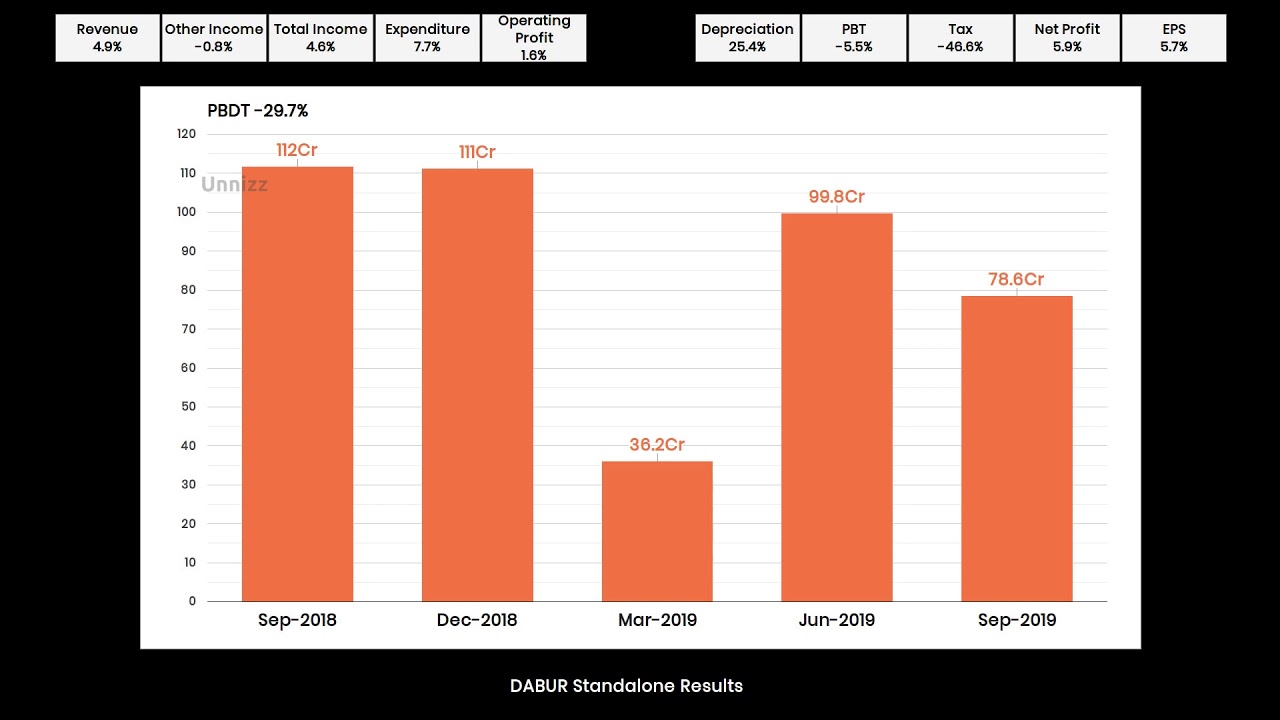


According to its Q2 earnings statement, Dabur India Ltd, a leading FMCG company, reported a decline in consolidated net profit by 17.65% to Rs 417.52 crore due to high food inflation and decrease in urban demand. Its total expenses were down by 1.31%, while standalone revenue from operations showed an 8.17% decrease. Despite the challenging environment, Dabur continued to engage consumers and recorded a consolidated revenue of Rs 3,029 crore in the quarter.
Dabur's Financial Performance: Decline in Q2 Profits Amidst Economic Challenges
Background
Dabur India Ltd. is a leading Indian multinational consumer goods company, headquartered in Ghaziabad, Uttar Pradesh. Founded in 1884, Dabur has a diverse portfolio of products spanning healthcare, personal care, food, and beverages. With a presence in over 120 countries, the company is known for its iconic brands such as Dabur Chyawanprash, Dabur Amla, and Real Fruit Juice.
Financial Performance
Recently, Dabur reported its financial results for the second quarter (Q2) of the financial year 2023-24. According to the earnings statement, the company witnessed a decline in its consolidated net profit by 17.65%. The profit dropped from Rs 507.83 crore in Q2 of the previous year to Rs 417.52 crore in the current quarter.
Factors Influencing Performance
Dabur attributed this decline to several factors, including:
Operational Performance
Despite the profit decline, Dabur's total expenses were down by 1.31% YoY. Additionally, the company's standalone revenue from operations showed an 8.17% decrease.
Top 5 FAQs on Dabur's Financial Performance
1. Why did Dabur's profits decline in Q2? A. Dabur's profits declined due to a combination of factors, including high food inflation and a decrease in urban demand.
2. What was the percentage decline in Dabur's Q2 net profit? A. Dabur's consolidated net profit declined by 17.65%.
3. Did Dabur's expenses increase in Q2? A. No, Dabur's total expenses were down by 1.31% YoY.
4. What was the standalone revenue growth of Dabur in Q2? A. Dabur's standalone revenue from operations showed an 8.17% decrease.
5. What is Dabur's strategy to address these challenges? A. Dabur plans to focus on cost optimization, product innovation, and expanding its rural presence to mitigate the impact of current economic headwinds.

According to Randstad India's latest report, young professionals in India are redefining workplace norms by prioritizing factors like pay, flexibility, and personal values. The report also reveals that Gen Z values continuous learning through AI tools and is more concerned about the impact of AI on job security. This calls for businesses to adapt to changing preferences and attract the next generation of talent by offering a mix of technical excellence and personal autonomy. The findings also emphasize the need for inclusive cultures and flexible policies in order to build resilient, future-ready businesses.

With the Gen-Z workforce making up about 27% of India's population, companies are struggling to retain this energetic cohort. A recent report by Randstad highlights the need for a change in mindset from employers towards the Gen-Zs. While they have long-term aspirations, they are also quick to move on to new opportunities if they feel undervalued or underpaid. This poses a challenge for employers who must find ways to keep this ambitious and driven generation engaged and progressing within their organizations.

Union Home Minister and Minister of Cooperation, Amit Shah, congratulated Amul and Indian Farmers Fertiliser Cooperative Limited (IFFCO) for securing the first and second ranks in the global ranking for cooperatives. This achievement is a testament to the boundless potential of cooperatives, which are being transformed into a global model of empowerment and self-reliance by Prime Minister Narendra Modi. The dairy sector, which is the backbone of rural livelihoods in India, has combined farmer-led cooperatives, women's participation and scientific practices to achieve remarkable progress. Additionally, the National Co-operative Exports Limited, set up by the government, has achieved a significant milestone in exporting agricultural commodities.

After purchasing his retirement property in Swansea, David Barlow has been forced to live in a motorhome on his driveway due to persistent damp and mould issues. Despite complaints to his property managers, the issue has not been resolved and Barlow fears for his belongings. The problem is believed to have been caused by faulty insulation installed by British Gas, but the company denies responsibility. This situation has put a hold on Barlow's retirement plans and has left him feeling frustrated and stuck.

US-based private equity firm Tillman Global Holdings (TGH) is reportedly in advanced discussions to invest up to $6 billion in Vodafone Idea Ltd, which could lead to a change in operational control. However, the investment is contingent on the Indian government providing comprehensive relief covering AGR and spectrum payment dues. If the deal goes through, it could dilute existing promoter holdings, including those held by Aditya Birla Group and Vodafone Plc. While the news has boosted investor sentiment, analysts caution that government approval and debt restructuring clarity are key to the execution of the deal.

The Indian real estate market is undergoing a major shift with rising home prices, as apartments priced between Rs 2 crore and Rs 5 crore now dominate sales. This change has been highlighted by a Redditor who expressed concerns over the dwindling chances of middle-class buyers to afford a house. According to a Moneycontrol report, the trend is a result of big developers focusing more on luxury projects, leaving affordable housing in the backseat. As a result, home ownership for the middle-class seems like a distant dream, with even government employees struggling to afford these expensive properties.

Vodafone Idea's share price saw a significant increase of 14% after the Supreme Court provided further clarity on the AGR dues issue. The court clarified that the government can consider providing relief for both additional and reassessed AGR dues, giving some respite to the struggling telecom operator. At the time of writing, Vodafone Idea's share price was trading at Rs 9.51, with a gain of 8.93%. This comes after the court's previous hearing which did not provide a clear ruling on whether the relief applies to only Vodafone Idea's plea or the entire pending AGR amount of nearly Rs 80,000 crore.

After failing to meet Apple's internal sales expectations, the ultra-thin iPhone Air is facing a significant production cut of 80%. The initial prediction of reducing production by one million units has now been deemed insufficient, highlighting deeper concerns about the device's market performance. This setback raises questions about the competitive landscape of high-end smartphones and hints at Apple's next possible move towards a foldable iPhone.

In an effort to secure their rights to their intellectual property, the Board of Control for Cricket in India (BCCI) has announced a new copyright agreement that will be in effect until 2025. This move ensures that BCCI maintains its exclusive right to reproduce, broadcast, and use any of its content, including images and videos, for commercial purposes. With the deal also covering the use of BCCI's logos and trademarks, it gives the governing body a tighter grip over its assets and sets a precedent for other sports organizations to follow suit.

The Social Security Administration recently released updates for 2026, including a potential 2.7% increase to benefits. However, the official announcement of the cost-of-living adjustment (COLA) could be delayed due to the government shutdown. While an increased COLA is positive for beneficiaries, some argue that it still may not keep up with the rising cost of living. Additionally, beneficiaries who currently receive physical paper checks will need to make arrangements for direct deposit or a Direct Express card to continue receiving their benefits.